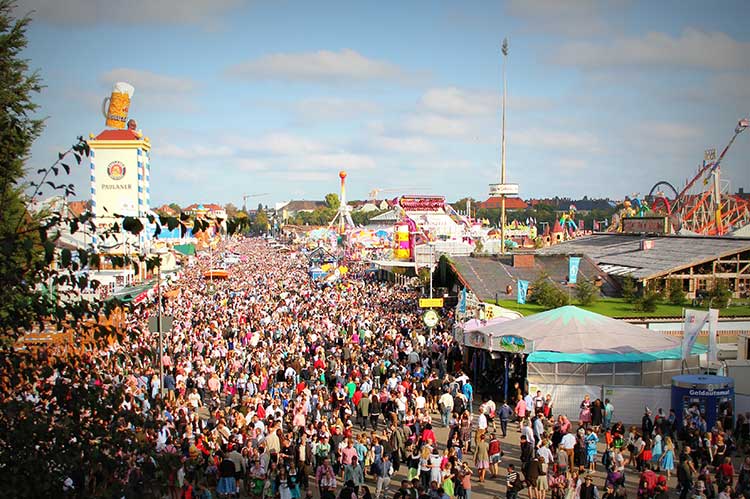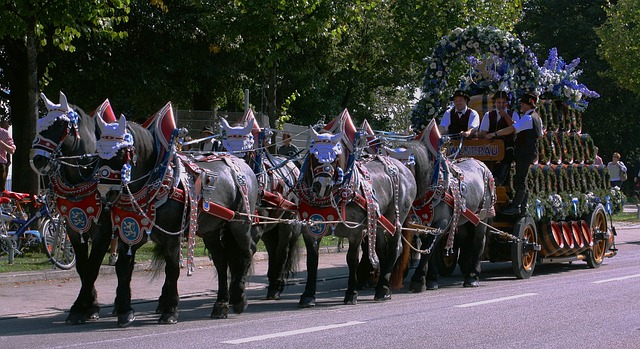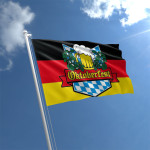
OKTOBERFEST – despite its name – begins in the third weekend of September and lasts until the first Sunday in October.
OKTOBERFEST began in 1810. Crown Prince Ludwig of Bavaria married Princess Therese of Saxony-Hildburghausen on 12th October 1810. The citizens of Munich were invited to the festivities which lasted five days. Anniversary celebrations were held annually from then onwards, becoming larger and more elaborate – from horse races to fairgrounds to a city of beer tents!
The main Oktoberfest event takes place in Munich, Germany but smaller Oktoberfest’s take place all around the world.
Today, Oktoberfest is the largest beer festival in the world, attracting over 6 million visitors each year and with worldwide coverage. During the festival 1.5 million gallons of beer will be drunk and 200,000 pork sausages & 480,000 spit-roasted chickens will be eaten!!
2016 is the 183rd Oktoberfest
Since Oktoberfest began is has NOT been celebrated 24 times. There was no Oktoberfest during the First and Second World Wars. In 1919 & 1920 Oktoberfest was replaced with “ Kleineres Herebstfest” , a smaller autumn celebration. In 1923 & 1924, Oktoberfest was cancelled due to heavy inflation in Germany. Oktoberfest was used as Nazi Propaganda by the National Socialists and in 1938 Oktoberfest was re-named Grosdeutsches Volksfest – meaning German Empire Folk Festival. From 1946 to 1948, Munich only celebrated the “Autumn Fest” and the sale of proper Oktoberfest beer – 2% stronger than normal beer- was not allowed.
From 1950, Oktoberfest has begun with a twelve-gun salute followed by the tapping of the first keg of Oktoberfest beer by the Mayor of Munich. Many local Bavarians also wear the Tirolerhute - Bavarian hat – during Oktoberfest.
Since the 1970s, local German gay groups have organised “Gay Days” at Oktoberfest and are usually on the first Sunday.
At the 1980 Oktoberfest, a pipe bomb was detonated at the main entrance, killing 13 people and injuring 201 more. This was the second deadliest terrorist attack in Germany’s history after the Munich massacre.
Oktoberfest today realises the importance of catering for visitors of all ages and families. Until 6pm, the orchestras in the tents play quiet brass music i.e. traditional folk music. This ensures a traditional beer-tent atmosphere is retained. After 6pm, louder and more popular music can be played! Oktoberfest had to adapt to the smoking ban and saw several different laws / regulations passed, some allowing the smoking in the beer tents, others forbidding it. However, since 2011 there is a blanket smoking ban in all beer tents.
Only beer conforming to the Reinheitsgebot and brewed within the city limits of Munich can be served at the Munich Oktoberfest. These beers are designated as Oktoberfest Beer. The breweries that can produce Oktoberfest beer are Augustiner-Brau, Hacker-Pschorr-Brau,Lowenbrau, Paulaner, Spatenbrau and Staatliches Hofbrau-Munich.
Since 1835, costume parades have taken place intermittently, however, since 1950 the parade has become an annual event, being one of the world’s largest and one of the highlights of Oktoberfest. On the first Sunday, 8000 people participate in the parade in their historic festival costumes, covering 7km to the festival grounds. There are rifle clubs, musical bands, flag wavers and decorated horse drawn carriages.
For all you Oktoberfest flags, bunting and decorations, including Bavarian products, click here to visit The Flag Shop, the UKs number one flag seller.
















